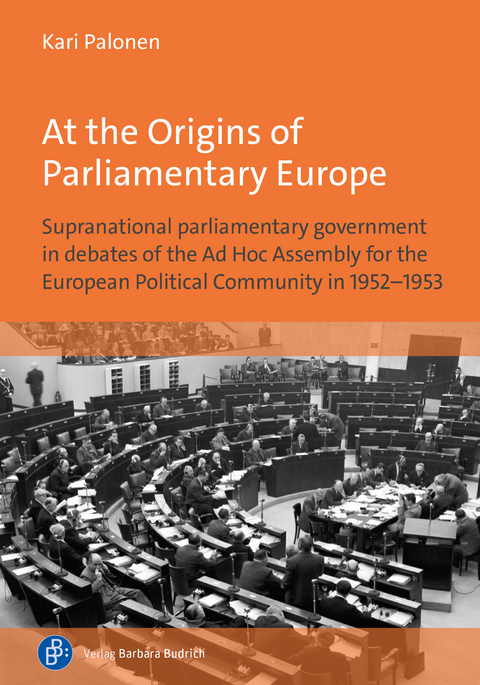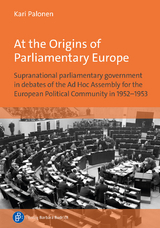At the Origins of Parliamentary Europe
Verlag Barbara Budrich
978-3-8474-3066-7 (ISBN)
Das Buch entdeckt diesen bisher vernachlässigten Ursprung des parlamentarischen Europas neu und untersucht die Bedeutung der Ad-hoc-Versammlung für die Politisierung der europäischen Integration. Es geht der Frage nach, wie die Versammlung als Projekt der europäischen Integration nach dem Zweiten Weltkrieg funktionierte, und erklärt sie als einen Moment in der politischen Theorie- und Begriffsgeschichte des Parlamentarismus, der Perspektiven für spätere Phasen der Parlamentarisierung der EU eröffnet. In 1952, politicians from Germany, France, Belgium, Italy, the Netherlands, and Luxembourg formed an Ad Hoc Assembly with the aim of drafting a constitution for a future European Political Community. Rediscovering this previously neglected origin of parliamentary Europe, Kari Palonen investigates the significance of the Ad Hoc Assembly for the politicization of European integration. He delves into how the debates of the assembly functioned as a project of European integration after the Second World War, interpreting it as a moment in the political theory and conceptual history of parliamentarism that opens new perspectives on the later stages of the parliamentarization of the EU.
1 A momentum of double politicisation
1.1 A parliamentary alternative for European integration
1.2 The Ad Hoc Assembly
1.3 Politicisation as a perspective on Europeanisation
1.4 Supranational politicisation
1.5 Parliamentary politicisation
1.6 Research agenda and practices of analysis
1.7 Plan of the book and acknowledgements
2 Parliament in post-war European projects
2.1 Post-war pro-European projects
2.2 The Hague Congress
2.2.1 The ‘Political Report’ and the ‘Political Resolution’
2.2.2 ‘European Deliberative Assembly’
2.3 ‘European Parliamentary Union’
2.4 A professorial draft for the European Constitution
3 The Council of Europe
3.1 The Concept of Europe in the Treaty of London
3.2 The Consultative Assembly
3.3 A federalist critique: André Philip
3.4 Committee plans for supranationalism
4 European Coal and Steel Community (ECSC)
4.1 From the Schuman Declaration to the ECSC
4.2 The Paris Treaty
4.2.1 The High Authority
4.2.2 The Common Assembly
4.2.3 The Council of Ministers
4.3 The Common Assembly plenum in September 1952
4.3.1 Opening declarations
4.3.2 The Rules of procedure
4.3.3 Parliamentary powers of the Common Assembly
5 Setting up the Ad Hoc Assembly
5.1 The political impulse
5.2 Remarks on studies on the Ad Hoc Assembly
5.3 The Ad Hoc Assembly debate in the Common Assembly
5.4 Constitution-writing by parliamentarians
5.5 The members of the Ad Hoc Assembly
5.6 The organisation of the Ad Hoc Assembly
5.7 The Ad Hoc Assembly as a parliamentary institution
6 The Politics of Naming
6.1 Naming rhetoric
6.2 Naming disputes
6.2.1 European Political Community
6.2.2 Self-naming of the Ad Hoc Assembly
6.2.3 European Parliament
6.3 Naming the polity
7 A supranational polity
7.1 A colourful conceptual history
7.2 Supranationalism in early European integration
7.3 Supranationalism in the Ad Hoc Assembly
7.3.1 Against nationalism
7.3.2 Supranationalism vs. intergovernmentalism
7.3.3 The delegation paradigm
7.3.4 The parliamentary condition
7.3.5 Europeanisation as freedom from dependence
7.4 Supranational policies
7.4.1 Economic policies
7.4.2 Foreign policy
7.4.3 Full and associated members
7.5 Supranational politicisation
8 The European Parliament
8.1 Histories of parliamentarisation
8.2 The Parliament of the Community
8.2.1 The organisation of Parliament
8.2.2 The bicameral system
8.2.3 Legislation and initiative
8.3 The Peoples’ Chamber
8.3.1 Direct elections
8.3.2 Proportional or majority representation
8.3.3 The distribution of seats
8.4 The Senate
8.4.1 A parliamentary chamber
8.4.2 Parity or balancing of seats
8.4.3 Membership and term length
8.5 Towards a supranational parliament
9 The European government
9.1 Council of National Ministers
9.2 The European Executive Council
9.2.1 Composition, powers, activity
9.2.2 Election and parliamentary responsibility
9.3 A draft for a European parliamentary government
10 Towards a supranational and parliamentary Europe
10.1 Parliamentary virtues of the Ad Hoc Assembly
10.2 Proposals for empowering the Parliament
10.2.1 The Vedel Report
10.2.2 The Spinelli Project
10.3 The legacy of the Ad Hoc Assembly
References
Index of actors
Index of concepts
| Erscheinungsdatum | 03.08.2024 |
|---|---|
| Verlagsort | Leverkusen-Opladen |
| Sprache | englisch |
| Maße | 148 x 210 mm |
| Gewicht | 450 g |
| Themenwelt | Sozialwissenschaften ► Politik / Verwaltung ► Europäische / Internationale Politik |
| Schlagworte | Council of Europe • ECSC • EGKS • Europäische Gemeinschaft für Kohle und Stahl • Europäische Integration • Europäische Politische Gemeinschaft • Europäische Regierung • Europäische Union • Europarat • European Coal and Steel Community • european government • European Government • European Integration • European Political Community • European Union • Government • Nachkriegszeit • Parlamentarische Debatten • parlamentarische Regierung • Parliamentary debates • parliamentary government • political theory • politicisation of Europe • Politische Theorie • Politisierung Europas • Post-War • Regierung • supranational • supranationale Politik • supranationaler Parlamentarismus • supranational parliamentarism • supranational polity • Westeuropäische Geschichte • West European history |
| ISBN-10 | 3-8474-3066-1 / 3847430661 |
| ISBN-13 | 978-3-8474-3066-7 / 9783847430667 |
| Zustand | Neuware |
| Haben Sie eine Frage zum Produkt? |
aus dem Bereich




